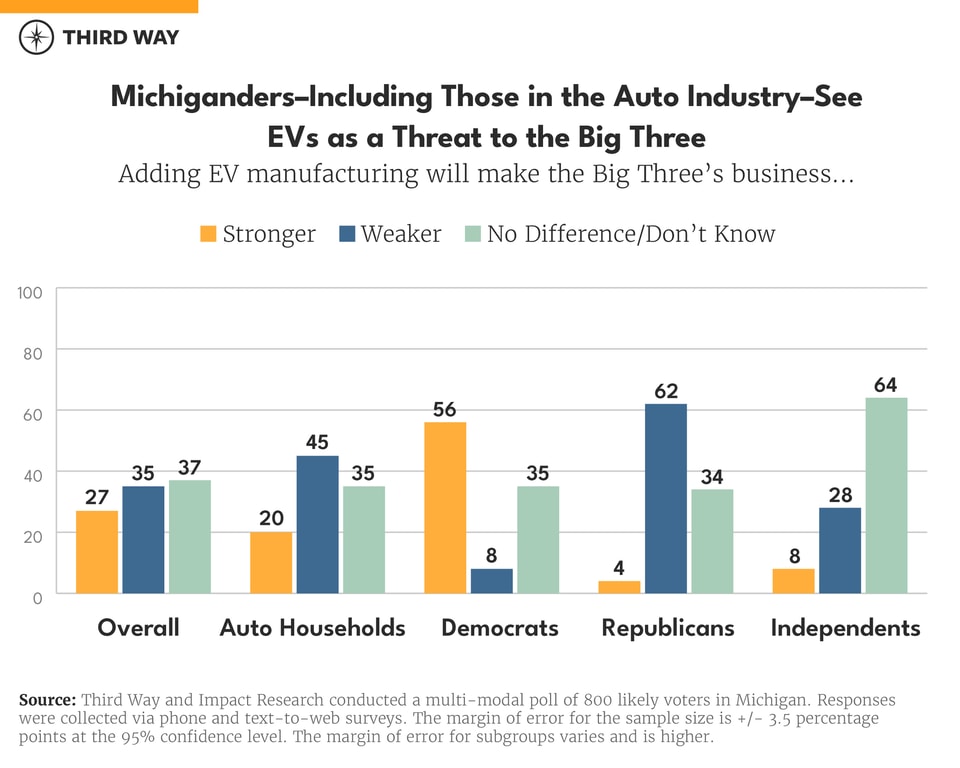Memo Published January 14, 2025 · 9 minute read
The Slotkin Method: How Democrats Can Win the EV Messaging War
Mary Sagatelova & Emily Becker

Democratic Congresswoman Elissa Slotkin faced an onslaught of anti-electric vehicle ads in her hotly contested Senate race against former Republican Congressman Mike Rogers. The ads positioned EVs as a threat to the state’s economy, falsely framing the Biden Administration’s EV policies as a “gas car ban” and warning Michiganders that the EV transition put their jobs in danger.
That message was pervasive: not only did Rogers himself claim EVs would drive Michigan’s auto industry off a cliff, but $10.3 million of anti-EV advertising hit the state’s airways in the weeks before the election.
And yet, despite stiff opposition, Slotkin beat back anti-EV attacks and eked out a victory in Michigan, partly because of her forceful argument that clean energy manufacturing is good for the state’s economy and not just a boon to environmentalists.
So how’d she do it? Third Way polling conducted before the 2024 election confirms the validity and efficacy of Slotkin’s message and provides a playbook for Democrats to take back the narrative on electric vehicles, correct course on messaging, and build support for this important clean energy technology.
We partnered with Impact Research to survey 800 likely voters in Michigan before the election, complemented by three focus groups of undecided voters (including one group of non-college white women, one of Black men ages 18-34, and one drawn from union households). Our research showed that, as a clean energy advocate, Slotkin faced stiff headwinds, with Michiganders fearing the clean energy transition could put them out of a job.
Michiganders like clean vehicles in the abstract. But in practice…
Clean energy may be appealing in the abstract, but our data shows that the ‘more real’ it gets, the more hesitant respondents become.
That trend is magnified for EVs, which are, for most Americans, the first time they have had to consider whether they’re willing to financially back the energy transition. To that end, questions about EVs prompted tremendous resistance from respondents: gas-powered cars are significantly more popular than their electric counterparts (by a 30-point margin) in Michigan.
Voters–including independents—worry that EVs aren’t a durable investment and doubt their significance moving forward. Just 40% of Michiganders believe EVs will play a major role in domestic auto manufacturing ten years from now. These numbers are even lower among Republicans (19%), auto households (33%) and Independents (37%).
Most importantly, survey participants were vehemently opposed to buying an EV anytime soon (63% said they don’t plan to buy one in the next ten years) and nearly divided on EV investments in the state, with just 48% in support of investing in Michigan EV manufacturing.
What’s causing EV skepticism?
On an individual basis, participants in our focus groups expressed range anxiety, concerns about finding a place to charge, and fears about repairing their EV should something go wrong. Others simply dismissed the cars as a fad that would eventually go out of style. On a more macro-level, however, we identified two worrying beliefs driving opposition to EV manufacturing in Michigan.
Good for the Planet, Bad for Business
The majority (54%) of respondents perceive Michigan’s shift to EV manufacturing to be driven by Washington politicians, not decision-makers at the Big Three. Perhaps as a result, Michiganders think the EV transition is moving too fast, with 58% saying the Big Three should slow its investments in EV manufacturing.
It’s no surprise then that voters think EVs are bad for business: 35% of respondents said investing in electric vehicles would hurt the Big Three’s bottom line. Just 27% see any benefit to the automakers going electric.

A Boon for China
Michiganders felt a rapid transition to EVs would benefit China more than the United States. By an 8-point margin, respondents felt rapid EV adoption would send more jobs to China than it would create in the US. That concern is shaped by larger fears about the state of the US auto industry: nearly half (46%) of all participants believe Michigan’s auto industry is getting weaker, driven in part by the transition to EVs.
To many, the EV transition threatens Michigan’s legacy auto industry and risks boosting its primary competitor, entrenching losses for Michigan’s already flagging manufacturing sector.
The Slotkin Method
Republicans seized on voters’ concerns about EVs, running ads that played to voters’ perceptions that electric vehicles are a fad, their fears of ceding ground to China, and their desperation to keep manufacturing alive in Michigan. Anti-Slotkin ads included the following messages:
- “Slotkin endorsed reckless electric vehicle mandates that threaten our way of life. Washington has always come first for her.”1
- “[Elissa Slotkin] supported giving MILLIONS of our tax dollars to a Chinese-connected EV company. Elissa Slotkin is leaving Michigan workers behind.”2
- “GM cutting 600 jobs in Warren. Stellantis, laying off 2,400 in Macomb County. Elissa Slotkin is making things WORSE. Voting to enrich China and supporting EV mandates that threaten Michigan auto jobs. Slotkin – leaving working people behind.”3
Slotkin’s rebuttal did not disavow EVs or dismiss voters’ concerns. Instead, she followed three simple principles for clean energy advocates communicating on EVs:
1. You’re not a car salesman, so don’t talk like one.
It isn’t your job to make Americans like electric cars; that’s the job of the auto companies. When advocates talk about EVs or rebut Republican attacks, the last thing they should emphasize is how great it is to own an EV. It doesn’t make Americans more supportive of investments in EV manufacturing or tax credits for consumers, and it’s out of touch with most Americans, who can often barely make ends meet, let alone afford a new car.
Instead, our polling shows that effective messages focus on the value of a strong domestic auto industry. The strongest argument we tested centered on making as many kinds of cars as possible in Michigan. Rep. Slotkin used a similar message in her race against Mike Rogers.
“We should be making as many cars as possible in Michigan now -whatever type of engine they have. If electric vehicles are going to be part of the auto industry's future, we need to make them here just like gas-powered cars, so Michigan remains a leader in auto manufacturing into the future.” – Elissa Slotkin
2. Make the economic stakes clear.
Most Americans are simply not motivated by their concerns about climate change. They don’t deny it’s real or accept that we should take action to reduce greenhouse gas emissions, but they struggle to prioritize climate action over everyday challenges, like paying the bills and finding consistent child care. But EV investments aren’t simply about climate. China leads the world in EV manufacturing and sales–that dominance has been immensely lucrative and beneficial to China’s global influence. Michiganders understand that a globally competitive US auto sector matters, both for their local economies and for global geopolitics.
Good messages on EVs don’t force listeners to prioritize climate change. Instead, they make it clear that EVs are a pathway to mitigating Americans’ existing concerns about Michigan’s manufacturing sector and future job opportunities.
3. Don’t run away from criticism. Lean in.
In her response to anti-EV critics, Slotkin didn’t shy away from criticism of EVs. She accepted that EVs aren’t right for everyone–again, she didn’t act like a car saleswoman–but firmly made the case for EV manufacturing.
Slotkin’s signature message emphasized that she doesn’t own an EV and wouldn’t make Michiganders buy one. But she wanted to ensure that if car companies are selling EVs, those cars should be made by American workers. Her argument met Michiganders where they were, acknowledged their anxieties, and made clear that EVs could help address some of their long-term economic concerns. Slotkin heard critiques of EVs, took them seriously, and pushed back hard with a clear message affirming the validity of investing in EV manufacturing.
“I live on a dirt road, nowhere near a charging station, so I don't own an electric car. No one should tell us what to buy and no one's going to mandate anything. But here's the thing. If there's going to be a new generation of vehicles, I want that new generation built right here in Michigan. Not China. I approve this message because what you drive is your call. No one else's.” – Elissa Slotkin
Our polling showed that after hearing messaging on EVs, support for investment grew by 10 points overall, with Republican women and older Republicans expressing an even greater shift in enthusiasm. Slotkin’s victory emphasizes the value of these messages and proves that clean energy advocates don’t have to reject the electric car to win elections.
By focusing on choice and ensuring Michigan remains a leader in auto manufacturing, Sloktin effectively responded to Republican attacks and addressed Michiganders’ core economic concerns.
Conclusion
Slotkin wasn’t the only candidate to face pushback for previous support for EVs.
In New York’s 1st district, Republican Nick LaLota framed Democrat John Avalon as prioritizing EV tax credits over Medicare and middle-class concerns. Similar messaging was used against Senator Jon Tester in Montana and Senator Tammy Baldwin in Wisconsin. Baldwin’s campaign was quick to call out the ads as lying, and Tester’s team chose not to engage. We don’t believe that either campaign’s messaging on EVs is solely responsible for the outcome of their races. But we know that there is tremendous scrutiny on clean energy advocates at every level of government and public life. Support for EVs can be misconstrued to position Democrats as out of touch with everyday people, more focused on the environment than on people’s pocketbooks.
Rep. Slotkin put Michigan at the heart of every message and made it clear that her support for EVs reflects her commitment to Michiganders, not the climate movement. Her strategy is a blueprint for Democrats who hope to set the record straight and stick up for clean energy.
Methodology
From September 9-15, 2024, Third Way and Impact Research conducted a multi-modal poll of 800 likely voters in Michigan. Responses were collected via phone and text-to-web surveys. The margin of error for the sample size is +/- 3.5 percentage points at the 95% confidence level. The margin of error for subgroups varies and is higher. The research was not conducted on behalf of the Slotkin campaign and was not focused on the 2024 Senate election—it was built to understand how voters perceived EVs in Michigan.

